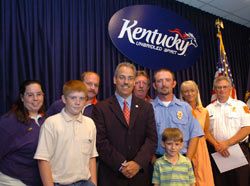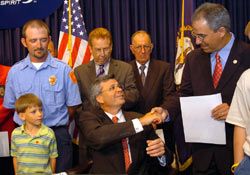By Charvi Magdaong
EMS1.com News Editor
As a volunteer paramedic, EMT or firefighter, you never talk about the risks that come with the job. They forever reside in the back of a volunteer’s mind, but that’s usually where it remains. Volunteers stay purposefully silent on this topic — not just for themselves, but for their family members, for their brothers and sisters in the field, and for all of those who care about them.
Jeramie Vance, a firefighter/EMT in Woodburn, Ky., knows all too well about the risks of volunteering.
In 2005, the eight year veteran and third generation firefighter was hurt in the line of duty. He was out of work for three months because of his injuries and then learned that he was replaced the week before he was supposed to return to his regular full-time job, leaving him to wonder how he would take care of his family. Today, he’s still trying to get his career back on track. But because of his struggles, Vance is making sure his fellow first responders won’t be forced to endure the same plight.
“I don’t want this to happen to anybody else,” said Vance. “This is something that can leave a bitter taste in your mouth.”
Through the efforts of Vance and his local state representative, Ky. State Rep. Jim DeCesare, legislation has been pushed through to ensure that other volunteers don’t have to suffer the same fate as Vance. DeCesare sponsored a bill earlier this year that amended a law to protect volunteers from losing their job if they are injured in the line of duty. Less than a handful of states have this type of protection for their volunteers, and Vance is on a mission to bring this kind of law nationwide. (Please see Kentucky Protects Volunteer EMS Professionals.)
Injured On The Job
On Thursday, September 8, 2005, Vance returned to his home from work around 10 p.m. About an hour and a half later, he got a call from the fire station for a multi-room structural fire, Code 3. As the first firefighter to arrive to the Woodburn station, Vance quickly pulled the rig around and, with his chief in the passenger seat, headed toward the fire.
As the Woodburn firefighters arrived to the scene, EMS was already there. A report of a family was trapped inside, and Vance’s adrenaline rushed through him. He dressed into his turnout gear and dropped the hose on his rig. Neighboring departments had also begun arriving and Vance reported to the command officer on duty. As directed, Vance went to relieve a firefighter on the front, when the fire overtook the house, and the structure began to collapse. He was unable to get clear of a falling wall, which nearly buried him and a fellow firefighter, James Beattie.
Medical attention was rendered on scene, and both firefighters were loaded into an ambulance and taken to the nearest hospital. Beattie was released immediately, only suffering from a dislocated shoulder. With more severe injuries, Vance was transferred to a trauma unit at Vanderbilt Medical Center in Nashville, Tenn.
“When 3,000 pounds fall on you, there isn’t anything that doesn’t hurt,” said Vance. “But the medical attention I received at the scene was some of the best care in the country.”
Vance was eventually released after a few hours in the hospital. Doctors diagnosed him with a fracture at the C4 vertebrae, which was causing pain in his shoulders and arms. His physicians said there was a possibility of long term effects, and Vance was bed-ridden for three weeks and forced to stay home for at least three months.
“I felt worthless,” said Vance.
Permanent Damages
For the next 11 weeks, he contacted his employer on a weekly basis, constantly updating his boss on his recovery. His boss never flinched, telling Vance each time that he would have his job back whenever he was ready.
When Vance got word from his doctors in late December that he was 100 percent healthy, he immediately phoned his boss to let him know that he was coming back. To his surprise, Vance’s boss said there was no place for him.
Vance’s boss said that his injury happened outside of work, and that he was never granted medical leave. Therefore, they had to find a replacement for Vance, and now they didn’t need him.
Vance said it was hard to find words to describe the emotions running through him when he hung up the phone.
“Everything was ruined,” said Vance. “My future, my plans were all gone. I went from a job that paid up to $20 an hour, had great benefits and insurance to a job that paid $10 an hour.”
It was a significant setback, and Vance was forced to work a couple part-time jobs to make ends meet. In the meantime, he sought out counseling to see if what his former employer had done was legal. After contacting his county’s attorney, he found out that there was nothing that he could do to force his former employer to hire him back.
 PHOTOS COURTESY JIMDECESARE.ORG Jim DeCesare, Woodburn volunteer firefighter Jeramie Vance, Gott Fire Chief Craig Peay, Woodburn Fire Chief Bob Skipper and various family members and friends at the signing of House Bill 256. |
 The Governor of Kentucky signs and presents Jim DeCeasre a copy of House Bill 256, which protects volunteer firefighters from losing their jobs if injured in the line of duty. Woodburn Volunteer Firefighter Jeramie Vance looks on. |
On The Road To Recovery
DeCesare, a proponent of public safety on many issues, heard about the local firefighter’s ordeal by word of mouth. In January, he introduced Bill 256, and based it on the language that protects the U.S. National Guard and other military personnel against dismissal from their jobs due to injuries incurred in the line of duty.
“Why must we be the exceptions?” asked Vance. “We carry the same risks, and I believe we should all be protected under the law.”
DeCesare took an existing wrongful termination law and added the following amendments:
No employer shall terminate an employee who is a volunteer firefighter, rescue squad member, emergency medical technician, peace officer, or member of an emergency management agency who is absent for a period of no more than twelve (12) months from the employee’s employment because of injuries incurred in the line of duty.
DeCeasre also added that the volunteer must provide a written statement from their department’s supervisor and a physician, stating that the first responder is injured and including a date for the employee’s return to work.
“It was the fair thing to do,” said DeCesare. “Most of Kentucky’s firefighters are volunteers. They take their own time and effort to train and protect our citizens. It’s a small thing that we can do to protect our volunteers with job protection.”
Still A Volunteer
As the year winds down, Vance is doing well. He continues to volunteer and is able to help out at the station whenever he has time. Firefighting is in his blood; his grandfather and great uncle were firefighting founders in the area, and he is committed to not allowing his ordeal to keep him away from performing a service that is depended on in his community.
However, his primary focus is on finding the type of well-paying job he had before, so his time spent firefighting is much less.
“Even though we’re volunteers,” Vance said, “we still have families, responsibilities.”
Vance knows as well as anyone that there will always be risks for those who work in the public safety field, whether they are paid or volunteers. While those risks cost him his livelihood and nearly his life, he is comforted by the fact that his fellow Kentucky volunteers are now protected under the law from a similar outcome.











